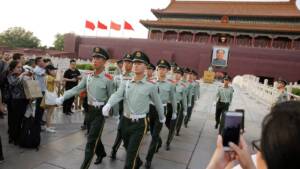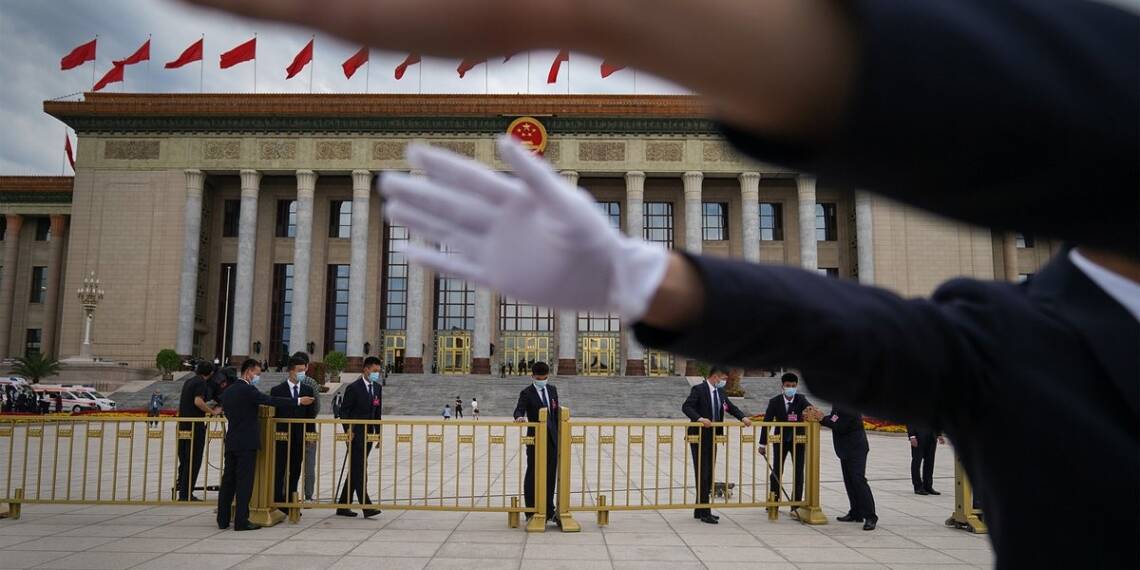A recent report by the U.S.-China Economic and Security Review Commission sheds light on China’s endeavors to influence international perspectives on topics such as Taiwan and Hong Kong through its robust censorship mechanisms. The report, titled “Censorship Practices of the People’s Republic of China,” was commissioned by the bipartisan USCC and conducted by Virginia-based Exovera’s Center for Intelligence Research and Analysis.
The document emphasizes China’s commitment to managing global public opinion, particularly on sensitive matters like Taiwanese sovereignty. Furthermore, the report underscores China’s dedication to advancing technologies, notably artificial intelligence, to bolster its online monitoring capabilities. The findings reveal a comprehensive strategy employed by China to shape narratives and control discussions on contentious issues, both domestically and abroad.
Join us on Telegram: https://t.me/tfiglobal
The report characterizes China as possessing the world’s most intricate and widespread censorship system. Under President Xi Jinping’s leadership, the country has significantly expanded and intensified its censorship apparatus, especially in consolidating control over online content. The report underscores the substantial challenge posed by Chinese censorship to American diplomatic, economic, and national security interests.

Notably, China has heavily invested in international public opinion guidance during Xi’s tenure. Chinese information operations often inundate foreign social media platforms with irrelevant content to manipulate or hinder discussions on sensitive topics. Economic coercion has emerged as a common tool, with China punishing over 120 companies in the past decade for supporting speech conflicting with Beijing’s core interests.
The report identifies diverse channels of influence, extending into niche subcultures like e-sports and virtual content creation. China aims to disseminate sympathetic narratives while suppressing harmful information on platforms like X, YouTube, and Facebook. Covert operations, including the use of botnet accounts and hijacking popular hashtags, further illustrate China’s information control strategies.
A significant focus is placed on China’s investment in advanced AI and big data analysis technologies for online content monitoring. This technology has the potential to enhance the precision and reach of China’s extensive media surveillance and censorship apparatus, posing an escalating threat to the global information commons. The report concludes with a cautionary note on China’s increasing capability to manipulate foreign audiences.
Read More: China’s FDI Hits 30-Year Low: What’s Driving the Exodus?
The report highlights China’s provision of support and advice on information control to various countries, including Laos, Pakistan, and Sri Lanka. The global censorship campaign led by China, as outlined in the report, has adverse implications for U.S. foreign policy. For instance, the report notes that China’s efforts to limit discussions on Taiwan, Hong Kong, and Xinjiang can potentially allow China to influence global public opinion, undermining U.S. national security interests. The report underscores the impact on American policy toward Taiwan, emphasizing China’s active censorship to diplomatically isolate the island and reduce international intervention likelihood in a potential cross-Strait conflict.
Moreover, the report issues a warning regarding China’s growing capabilities in messaging enhancement through new technologies, such as generative AI. It suggests that these capabilities are likely to become more sophisticated and effective over time. The report concludes by expressing concern that the Party’s ability to shape global attitudes and narratives is expected to gain increased potency.
The report offers several recommendations to Congress. Firstly, it suggests that the United States should enhance coordination with the private sector to counter disinformation campaigns initiated by the People’s Republic of China (PRC). This collaboration aims to strengthen the nation’s ability to respond effectively to PRC’s influence efforts.
Secondly, the report proposes supporting the development and dissemination of tools designed to thwart common ‘information saturation’ techniques. These techniques involve the use of botnets to hijack and algorithmically manipulate online conversations, especially on sensitive topics. By endorsing tools that prevent such manipulative strategies, the United States can mitigate the impact of information saturation.
Read More: Is the US pushing China out of the Internet?
Additionally, the report advocates for reinforcing efforts to restrict the sale of component parts essential for constructing tools utilized in information manipulation. This includes controlling inputs like data employed in training machine learning models, thereby curtailing the proliferation of technologies facilitating disinformation campaigns.
Lastly, the report recommends issuing a public advisory list identifying PRC-based companies that actively support state censorship, including their subsidiaries or shell companies. This public disclosure serves as a measure to raise awareness and facilitate informed decision-making regarding engagements with entities associated with state censorship initiatives led by the PRC.








